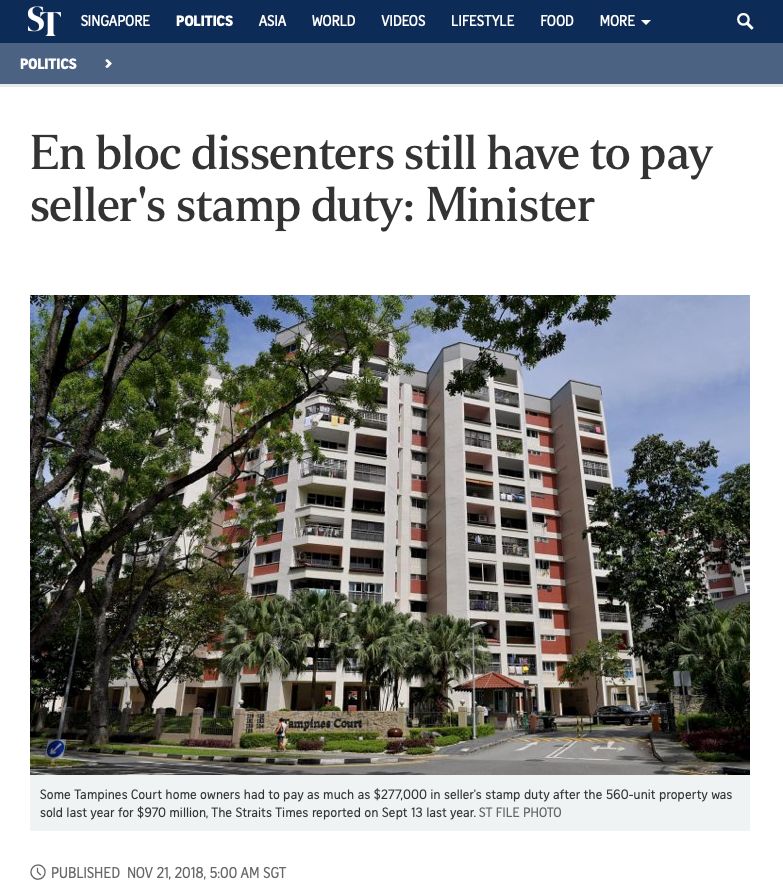The Other Owners Agreed To An En-bloc Right After I Moved In: Now What?
May 22, 2020

You could see from the dated exterior that the condo was old. Perhaps your property agent, or even the mortgage banker, made a face when they saw the remaining lease. But whatever the case, the old property was perfect for you.
Perhaps it was just 500 metres from your children’s school; perhaps your parents lived just two streets over. Or maybe it’s just the thought of being able to wake up an hour later every morning, with work just across the road.
But whatever the case, all your renovations and moving in has proven to be for nothing. You’ve barely warmed the sofas before you hear the dreaded news: the other owners have agreed to an en-bloc sale. And that also means being faced with some steep, unexpected stamp duties.
What can you do now?

So many readers write in because they're unsure what to do next, and don't know who to trust.
If this sounds familiar, we offer structured 1-to-1 consultations where we walk through your finances, goals, and market options objectively.
No obligation. Just clarity.
Learn more here.
The three main issues of an en-bloc sale right after moving in
- The Sellers Stamp Duty applies within the first three years
- The method of sale may not account for your latest renovations
- Financing issues in quickly finding a new home
1. The Sellers Stamp Duty (SSD) applies within the first three years
The Sellers stamp duty is a stamp duty that’s a percentage of the selling price. It’s 12 per cent in the first year (the equivalent of ABSD for Singapore Citizens buying a second property!), eight per cent in the second year, and four per cent in the third year.
SSD no longer applies in the fourth year or beyond.
So if the en-bloc sale happens within 12 months of you purchasing the property, you would pay a hefty $180,000 if the sales proceeds were $1.5 million. This could more than wipe out any potential profits from the en-bloc sale, if you add it to your recent costs like renovations and furnishing.
2. The method of sale may not account for your latest renovations
It’s one thing to face an en-bloc after five or more years of moving in, when you’ve had time to at least enjoy and wear out some of your new renovations. But it’s a huge loss to spend, say, $30,000 to $50,000 renovating a unit, and then getting nothing out of it.
But that’s exactly what may happen, depending on how the development is valued during an en-bloc. For example, the valuation may proceed purely on a share value basis (i.e. the higher your share value, the more you get), which doesn’t take into account any recent renovations.
Even if the valuation does account for your renovations, it’s seldom able to cover the costs. It’s quite possible to have $50,000 of renovations done at the start of the year, and then have it valued at half that amount by December of the year. This varies based on the valuation company used, but it’s not as if you have much individual control over that.
Coupled with the SSD, and the cost of having to move again, this can make for a very unprofitable en-bloc sale.
3. Financing issues in quickly finding a new home
Under normal circumstances, you have a long time to prepare before moving to a new home. You have months or even years to work out the cost of temporary accommodation, or the down payment on the next property (if you want to move right away and sell your existing home later).
But if you happen to wander into an en-bloc sale, you may be unprepared for the costs. For example, you could be waiting for a year before the proceeds from the en-bloc arrive; but in the meantime, you already need to start looking for a new home, working out the cash down payment needed, etc.
And this is just after you’ve made the cash outlay on your existing property.
There’s also the terms and conditions of your current home loan to worry about. For example, prepayment penalties often apply during the first one to three years. If you use the en-bloc cash proceeds to pay off the existing home loan – such as in the first year or two – you may end up paying penalties as high as 1.5 per cent of the amount redeemed.
What can you do?

You have a better chance of stopping the en-bloc if the situation is so bad you’d lose money (i.e. end up with total costs that exceed your sales proceeds), rather than just make less money.
That’s because you can appeal to the Strata Titles Board (STB) if an en-bloc sale would cost you a financial loss. This can be done even after the 80 per cent consensus for an en-bloc has been reached.
The authorities won’t approve the application of the collective sale, if any registered owner can prove they would incur a financial loss.
However, a “financial loss” means actually losing money on the sale, not just making substantially less. For example, if your total expenses in buying the property is, say, $1.2 million, and the en-bloc would end up costing you $1.25 million, that’s a financial loss.
If the en-bloc would still make you $1.2 million or slightly more, that’s not a financial loss.
Even if you can prove you’d take a financial loss, that may not stop the en-bloc.
If you would incur a financial loss, the en-bloc could still go ahead. But only if the collective sale committee consents to give you more of the proceeds.
If the authorities feel it would be fair, they can order that the collective sale committee apportion a greater share of the proceeds to you (if the committee consents to do this, rather than give up on the sale).
There is a specific rule for this:
Under the Land Titles (Strata) Act, the sum paid out from the proceeds of the other registered owners cannot exceed the aggregate sum of 0.25 per cent of the proceeds of sale for each unit, or $2,000, whichever is higher.
In other words, if the amount would cause any registered owner to pay more than $2,000 of their proceeds, then they can’t go ahead with it. Otherwise, you may just have to take your higher proceeds and go along with it.
Beyond the above situation, there really isn’t much else you can do.
It’s a bad idea to try and argue your case alone, especially if you’re not familiar with the en-bloc process.
It’s a good idea to approach a conveyancing lawyer, if you want to try and stop an en-bloc that’s happening too soon for you. It is a very involved process; you’ll have to pore through the numbers, and produce all the documents and arguments to demonstrate your financial loss.
You’ll also need to talk to a mortgage expert, on what will happen regarding your existing home loan.
Many loan packages will waive the penalties for early loan redemption, if it happens as the consequence of an en-bloc sale; but don’t assume it’s the case in every home loan.
You’ll also need to work out the financing issues of selling and buying again so soon; especially given that en-bloc sales take a while to grant you the sales proceeds (it can happen as late as 12 months later). Banks do have financing options to help you through this, such as bridging loans.
If you’re in this situation, contact us quickly on Facebook. We can put you in touch with the experts you need.
Finally, do brace for the possibility of needing to find a replacement home, and fast.
It’s entirely possible that you’ll get higher sales proceeds, but still have to scramble to find a new home. You can check out in-depth reviews for a replacement property at Stacked; whether to buy or just to rent in the interim.
If the situation is urgent, contact us directly so we can work out the best options, based on your timeframe and budget.
At Stacked, we like to look beyond the headlines and surface-level numbers, and focus on how things play out in the real world.
If you’d like to discuss how this applies to your own circumstances, you can reach out for a one-to-one consultation here.
And if you simply have a question or want to share a thought, feel free to write to us at stories@stackedhomes.com — we read every message.
Ryan J. Ong
A seasoned content strategist with over 17 years in the real estate and financial journalism sectors, Ryan has built a reputation for transforming complex industry jargon into accessible knowledge. With a track record of writing and editing for leading financial platforms and publications, Ryan's expertise has been recognised across various media outlets. His role as a former content editor for 99.co and a co-host for CNA 938's Open House programme underscores his commitment to providing valuable insights into the property market.Need help with a property decision?
Speak to our team →Read next from Property Advice

Property Advice We Sold Our EC And Have $2.6M For Our Next Home: Should We Buy A New Condo Or Resale?

Property Advice We Can Buy Two HDBs Today — Is Waiting For An EC A Mistake?

Property Advice I’m 55, Have No Income, And Own A Fully Paid HDB Flat—Can I Still Buy Another One Before Selling?

Property Advice We’re Upgrading From A 5-Room HDB On A Single Income At 43 — Which Condo Is Safer?
Latest Posts

Singapore Property News I’m Retired And Own A Freehold Condo — Should I Downgrade To An HDB Flat?

New Launch Condo Reviews What $1.8M Buys You In Phuket Today — Inside A New Beachfront Development

Overseas Property Investing This Singaporean Has Been Building Property In Japan Since 2015 — Here’s What He Says Investors Should Know





































10 Comments
Hi Ryan,
If today I buy a condo apartment for $1200psf and 2yrs later it get en-bloc. Is it possible that I might get back less than I pay for the apartment (excluding the renovation cost)?
Hi Ryan, Is SSD of 3 years counts when we exercise or after completion of purchase?
What is the SSD calculate end time? From the date that approvals have been received from the Strata Title Board or the completion of the collective sales?
Hi Ryan,
I am planning to buy a 2nd hand condo. I am afraid that it is under En Bloc process. Does that condo’s unit seller or that sell’s property agent have the responsibility to inform me that his unit is under En Bloc?
I am afraid to be forced to pay the huge SSD, and waste the big renovation cost.
Thank you.
Hi does the buyer have to pay for SSD as well?